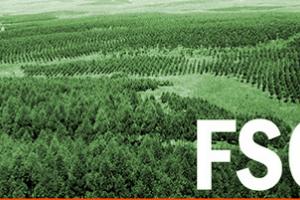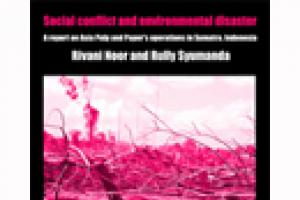When a forestry operation is certified under the Forest Stewardship Council system, it should mean we can all relax in the knowledge that the forests are reasonably well managed. Unfortunately, it seems, this is not the case. SmartWood, an FSC accredited certifier, recently certified forestry operations in Laos which are producing timber that is illegal under the Lao Forestry Law.
Large-Scale Tree Plantations
Industrial tree plantations are large-scale, intensively managed, even-aged monocultures, involving vast areas of fertile land under the control of plantation companies. Management of plantations involves the use of huge amounts of water as well as agrochemicals—which harm humans, and plants and animals in the plantations and surrounding areas.
Publications
22 September 2006
Selection of articles published in the monthly electronic bulletin of the World Rainforest Movement, addressing the impacts of the oil palm plantations in the forestss.
Oil Palm. From Cosmetics to Biodiesel, Colonization Lives On
1 September 2006
Press Release - September 1, 2006
Publications
25 August 2006
By Patricia Granda
Through various government programmes and initiatives, with the support of international cooperation agencies, monoculture tree plantations have been established in Ecuador’s three mainland regions.
Publications
22 August 2006
By Rivani Noor and Rully Syumanda
Bulletin articles
1 August 2006
In the world of today, many millions of people’s level of consumption does not even cover their basic needs. In plain language, these are millions of people – mostly children – suffering from hunger and misery. On the other hand, there are also millions of people – although much fewer – who consume too much, without this meaning that their basic needs – as human beings – are thus satisfied.
Other information
1 August 2006
The case of Veracel Celulose is useful – as are so many others – in revealing the falseness of business discourse on “sustainability.” Veracel is a modern company, owned in equal parts by the Swedish-Finnish Stora Enso and the Norwegian-Brazilian Aracruz Celulose. Veracel is the owner of 164.000 hectares of land, 78,000 of which have been planted with eucalyptus trees in the State of Bahia, where last year its gigantic pulp mill started operating, with an annual production of 900,000 tons of pulp for export.
Other information
1 August 2006
The coastal village of Mehuin is located in the Northeastern zone of the Province of Valdivia, on the borders of the ninth and tenth regions of Chile. It is a small bay, fed by the river Lingue, and surrounded by the mountains of the coastal cordillera. It has a population of approximately 1,700 people, but co-inhabits with 13 communities comprising some 3,000 Mapuche-Lafkenche indigenous peoples who come down to the village to sell their products and to get supplies. Some very well defined sectors also exist in Mehuin, with their own cultural characteristics.
Other information
1 August 2006
The Ñielol hill located near the city of Temuco in Chile’s Ninth Region, is a faithful witness to the numerous lies circulating both in this region and in many others in the country as well as in other countries, regarding forests and plantations.
Other information
1 August 2006
The Finnish company Oy Metsä-Botnia Ab (Botnia’s trade name) established in 1973, is the second largest pulp producer in Europe. It has four subsidiary companies, two of which are located in Uruguay: Compañia Forestal Oriental S.A. (FOSA), that has eucalyptus plantations; and Botnia S.A. established in 2003 to implement the project to install a pulp mill producing one million tons per year.
Other information
1 August 2006
Extensive cultivation of oil palm and the resulting oil extraction have always been linked to repression. Plantation cultivation was originally established by colonial regimes. The rapid expansion of plantations in Asia following the Second World War was encouraged in connection with forest clearing and was used as a weapon in combating Malay rebels.
Other information
1 August 2006
Oil palm plantations are expanding in South America: Colombia, Ecuador, Venezuela and now Peru have joined the commercial thrust. The companies find profitable opportunities at the expense of the invaluable Amazon forest and of the lives of peasants who are displaced from their lands where they obtain their means of livelihood.




